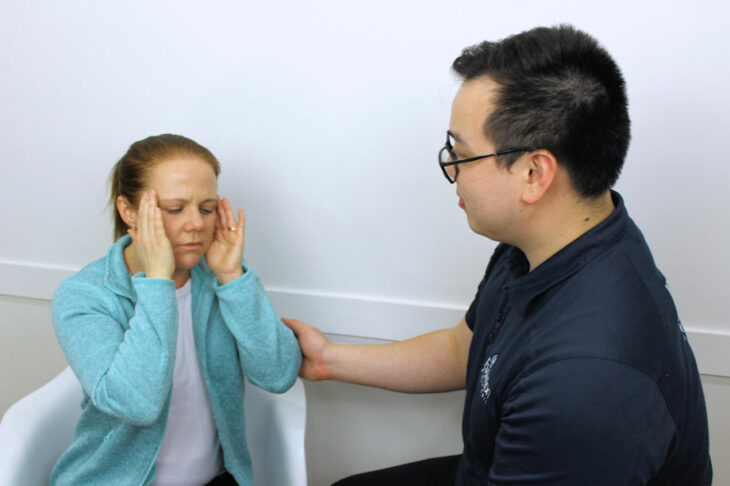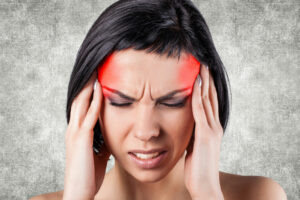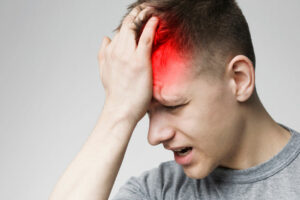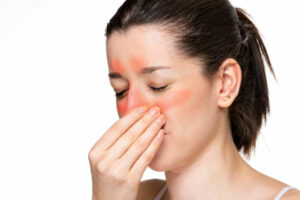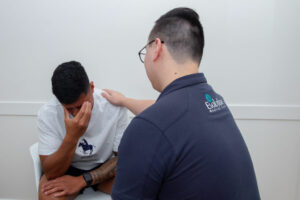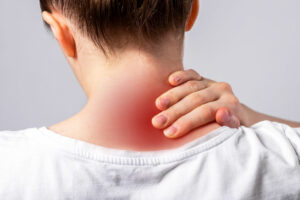We’ve all experienced headaches at least once in our lives, and we all know how debilitating they can be. Headaches impact our daily activities to varying degrees, at times leaving us bedridden, stopping us from being able to work or enjoying our time off with family and friends.
A headache is a pain in your head or face that’s often described as a build-up of pressure that’s throbbing, constant, sharp or dull. Headaches can differ greatly in regard to the type of pain experienced, the severity of the pain, and the location and frequency of when this pain occurs.
It’s important to understand the type of headache you are experiencing, not only to alleviate symptoms but to know what’s causing them in the first place, therefore to be able to prevent them from occurring in the future.
Different Types of Headaches
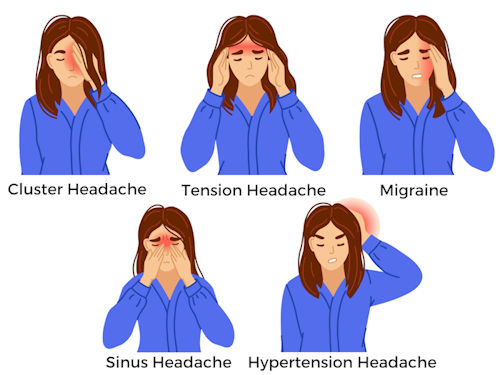
Tension-Type Headache
Headaches brought on by tension are by far the most common kind of headache. The sensation experienced is regularly compared to a tight band being wrapped around the head. Pain can occasionally even expand to the shoulders and neck. Tension headaches are characterised by a pressing or tightening feeling. The discomfort might linger anywhere from half an hour to many days, or it could even be constant. Anxiety, mental stress, melancholy, improper posture, pressure on the eyes, and a lack of sleep are the most prevalent factors that contribute to tension-type headaches.
Signs and symptoms of a tension headache include:
- Dull ache in the head
- The sensation of tightness or pressure across your forehead, the temple and the back of the head.
- Tenderness over the scalp, neck, and shoulder regions.
Migraine
Many individuals who have migraines feel sick for a brief amount of time before the headache even starts. Some individuals report seeing flashing lights, experiencing changes in their eyesight, or having trouble expressing themselves verbally. This phenomenon, which often takes place before the onset of a migraine headache, is referred to as an aura. When it first starts, the headache is almost always extremely severe. A pounding sensation will start to creep up on you, and it’s possible that you’ll become hypersensitive to light and sound as well. The duration of this condition might range anywhere from a few hours to a few days.
According to recent research, migraines impact over 3 million people in Australia and are about twice as prevalent in females as males because of hormonal considerations. Migraines frequently start throughout adolescence, although they most frequently manifest themselves in a person’s 20s or 30s. There is also the possibility that being susceptible to migraines is inherited.
A migraine is a type of headache that is brought on by irregular activity in the brain. This abnormal activity can be brought on by a variety of factors, including hormonal shifts, emotional triggers, drugs, or even physical reasons like sleeplessness. However, the precise cause is still unknown currently.
Cluster Headache
A cluster headache is characterised by its abrupt onset and termination; it also typically occurs without any prior warning. Cluster headaches, despite their relatively brief duration, are excruciatingly painful and can persist on a daily basis for several weeks or months at a time. Cluster headaches have been linked to a nerve in the face, which is believed to be the source of the acute pain that occurs around the eyes in sufferers. Cluster headaches can be significantly more debilitating than migraines, despite the fact that their duration is often shorter.
Physical symptoms of a cluster headache include:
- Swollen, teary and red eyes
- Runny or blocked nose
- Red, warm face
- Sensitivity to light
- Discomfort or a mild burning sensation in the face
Sinus Headache
Congestion of the sinus passages that are located behind your eyes, nose, cheeks, and forehead can lead to headaches that are known as sinus headaches. This result is a build-up of pressure, which can either be on one side or both sides of your head and can produce discomfort in any location. Pain may also radiate to the front of the face, the teeth, and the rear of the skull.
A sinus infection or inflammation of the sinuses, known medically as sinusitis, can cause headaches related to the sinuses. If you suffer from allergies or experience occasional episodes of sinusitis as a result of allergen triggers, this may occur seasonally.
Symptoms of inflamed sinuses accompanied by sinus headaches include:
- Nasal Congestion
- Runny Nose
- Green or Yellow Nasal Discharge
- Weakened sense of smell
- Uncomfortable pressure behind your forehead
- Pain that increases when leaning forward
- Redness and swelling of the cheeks, nose, and forehead
- Fever
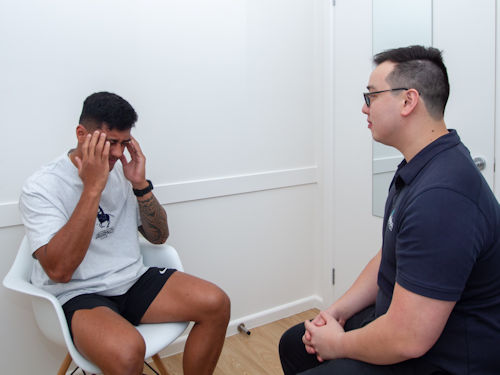
Hormone Headache
Hormonal headaches are headaches that are induced or made worse by changes in oestrogen and progesterone levels. Hormonal fluctuations can also make existing headaches worse. These headaches may begin as early as two days before a period begins or as late as three days after it has begun. However, periods are not the only thing that can induce hormonal headaches; in fact, everything that might cause levels of hormones to alter has the potential to cause headaches. This could include things such as using birth control, undergoing hormone replacement treatment during perimenopause, becoming pregnant, or breastfeeding after giving birth.
Hormonal headaches are much like any other type of headache, and the symptoms typically include:
- Throbbing pain on one side of the head
- Nausea or vomiting
- Appetite Loss
- Sensitivity to light, sound, and smell
- Chills
- Sweating
- Pale skin
- Belly pain
- Blurry vision
- Dizziness
Hypertension Headache
A rapid rise in blood pressure to an abnormally high level can cause a severe type of headache known as hypertension headache. The symptoms, which include a significantly increased amount of pressure in the morning, typically become better as the day progresses. These headaches have been described as having the discomfort of a “hair band,” and may feel like the head is pulsating. Although hypertensive headaches can strike people of any age, their prevalence rises with age.
Other symptoms may include:
- Nausea
- Vomiting
- Dizziness
- Visual disturbance
Therapies to Help Headaches
Headaches can be debilitating and can greatly affect a person’s quality of life. There are many different modalities available to relieve headaches including both conventional and alternative treatments. Here are some common modalities to relieve headaches.
Medication
Most headache medication is available over the counter without a doctor’s prescription. The main medications for headaches are pain relief medicines. These include paracetamol, aspirin, and non-steroidal anti-inflammatory drugs (NSAIDs) such as ibuprofen. Pain relievers are only meant for short-term usage because they do not address the underlying cause of the headache or migraine. When taken regularly or for a lengthy period of time, these drugs might cause rebound headaches, which are headaches that develop as a side effect of taking pain medications. Furthermore, excessive use of these drugs might result in overuse headaches, a condition in which the headache gets more frequent and severe.
Manual Therapies
Manual Therapies include Remedial Massage, Cupping Therapy and Trigger Point Therapy. Releasing tension in the muscles of the head, neck, and shoulders is one of the primary ways that Remedial Massage helps with headaches. Deep tissue massage, trigger point treatment, and myofascial release are all approaches that can help further reduce muscle tension. These techniques include applying pressure to certain places on the body, which aids in the release of tension and the improvement of blood flow to the region.
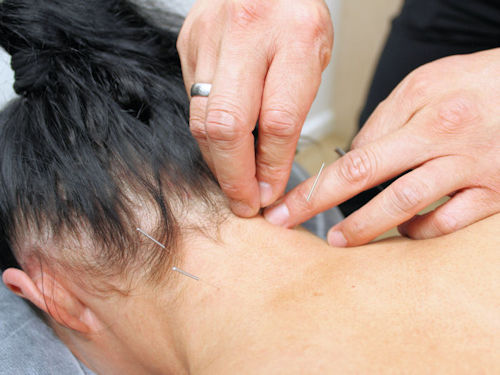
Acupuncture
Acupuncture is a powerful technique that involves the gentle insertion of fine needles into specific parts of the body to promote changes to improve overall health. Muscle strain in the head, neck, and shoulders is one of the most common causes of headaches. By stimulating the acupoints connected with these muscles, Acupuncture can aid in the release of this tension. This can assist to alleviate the discomfort and agony associated with headaches. Moreover, Acupuncture can enhance circulation, which helps relieve pain and inflammation.
Acupuncture also alleviates headaches by balancing the body’s natural hormone levels. Hormonal imbalances such as a drop in serotonin, which is crucial for regulating mood and pain, can produce headaches. Acupuncture can help restore hormonal balance and promote general wellness.
Acupuncture is an incredibly effective modality for interrupting the pain cycle of headaches, significant research shows that Acupuncture has been shown to decrease headache frequency and severity. In the management of headaches, studies have shown that Acupuncture reduces the need for medication, improves relaxation, promotes the release of endogenous opioids (our body’s natural painkillers) and reduces muscular tension in the neck and back which is commonly associated with headaches.
Take the First Step Towards Relief Today!
Headaches are extremely common and many people don’t realise that there are different types of headaches which all have different signs and symptoms. When appropriate treatment and steps are taken, headaches can be prevented or in the least have the symptoms reduced in intensity and frequency to improve overall health.
In order to achieve the best outcomes for your health, as always, we recommend speaking to a healthcare professional. In many cases, there may be multiple issues contributing to your headaches – Our team of Professional Practitioners will effectively assess and advise the most appropriate course of action for your situation. I hope that helps shed some light on the topic! If you would like to learn how we can help you, please call our friendly team on (02) 4709 6727

